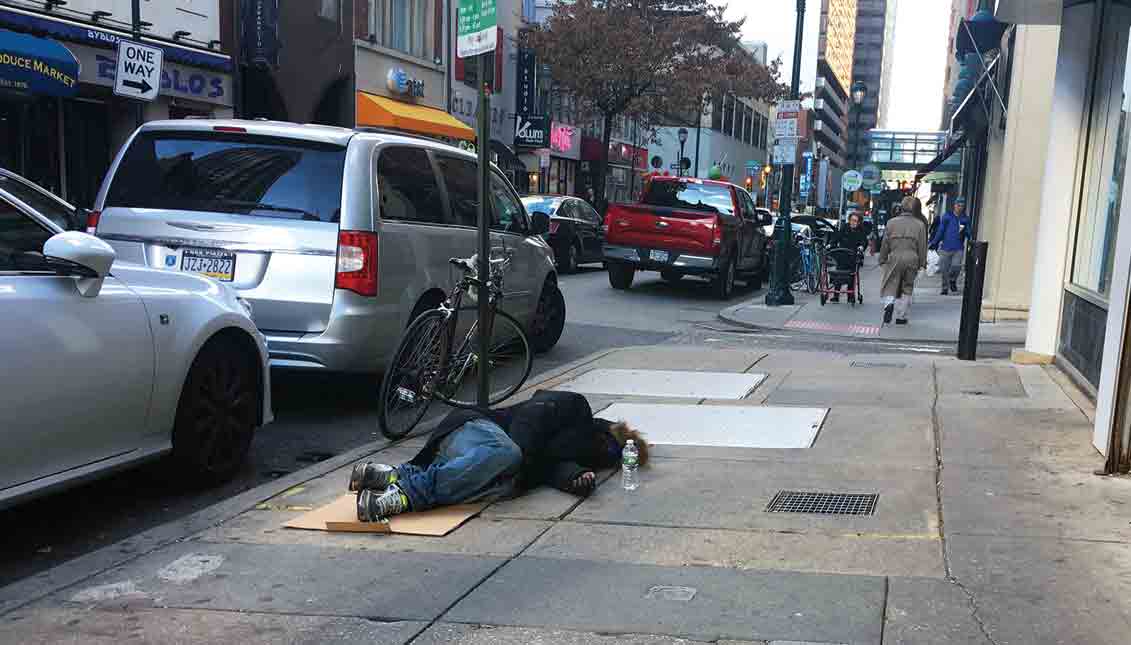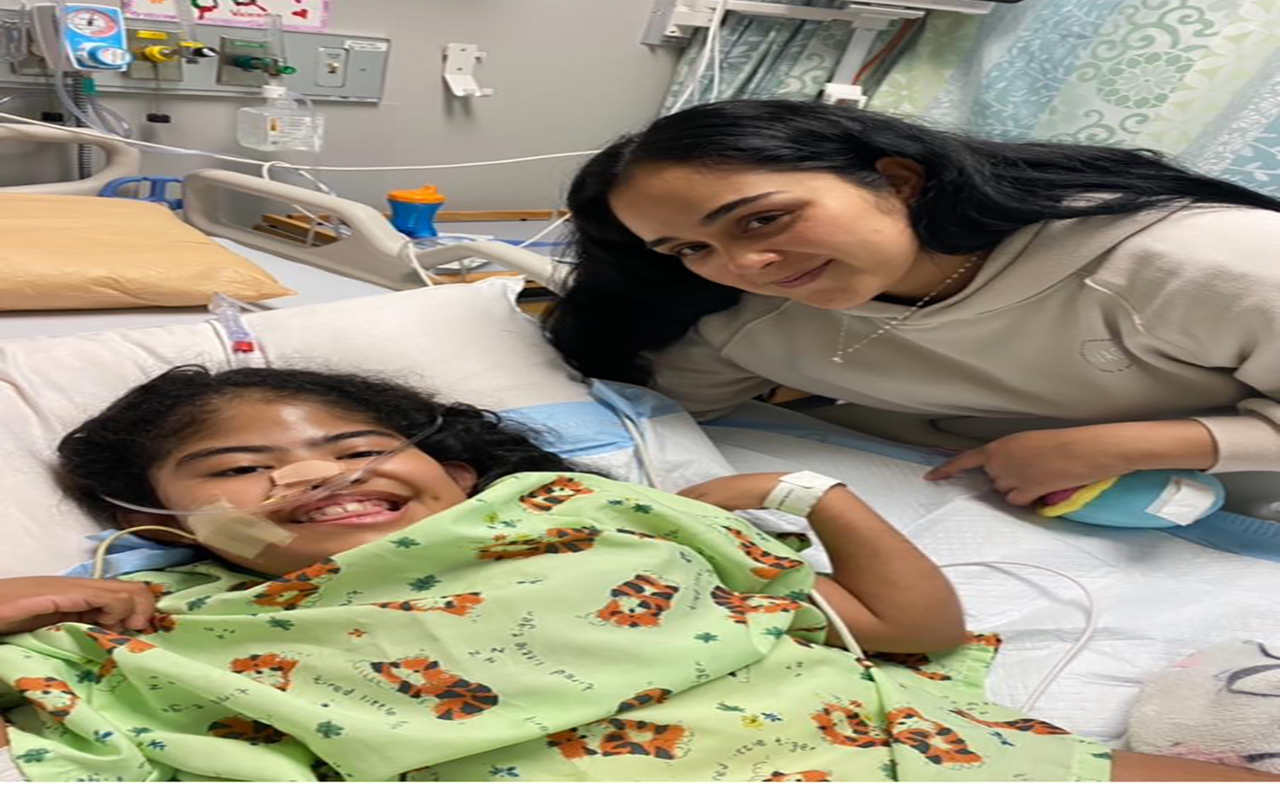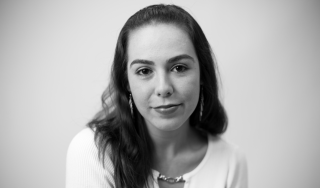
Want to Save a Life? Push a Few Buttons
As Nikki Johnson-Huston was click-clacking her heels to get to her office on 15th and Market, she suddenly craved a steaming cup of Wawa coffee to get her…
Before pulling the door to step inside the staple shop, brimming with freshly baked sprinkled blueberry donuts, jalapeño poppers, and of course, hoagies galore, she was halted by the sight of a shivering homeless man. “Please ma’am, could you spare some change? I could really use something to eat” he croaked from his stoop. Johnson-Huston pulled a crumpled up $5 bill from her wallet-- the smallest bill she had on her –and set it on the man’s raggedly gloved hands, and proceeded to carry on with her initial mission: caffeinating.
Without paying much heed to that brief morning encounter, she stood unfazed in the winding line of young professionals and college students getting their fix, until, from the corner of her eye, she saw that very same homeless man using her $5 to buy a pack of Camels.
Johnson-Huston was jaded, not because she felt blindsided by the beggar, but because she recalled feeling that her $5 had been insufficient, not in finite monetary amount but in beneficial value. For Johnson-Huston’s disgruntlement had less to do with bang for her buck and more with an issue far more personal than an emptier wallet: Nikki Johnson-Huston, now an established tax lawyer in Philadelphia, was once in that beggar’s very stratum, holding out her hands for a means to get by in copper or silver.
“I’ve been homeless three times in my life,” she said. “Once when I was about 9 years old, another time when I was 15, and finally when I was 19. My mom was single with children in California. We were food insecure, home insecure, and generally insecure about which path to take and our futures. We didn’t always do things the legal way, or the right way. I got lucky, but I know that there are so many that have not been able to break away from being ‘that homeless girl.” For Johnson-Huston, luck came in the form of a college scholarship to St. Joseph’s University after excelling in her public school courses, and in the emotional and monetary support of her grandmother, who always told her that “There is no shame in being poor, but being poor in character.” The fusion of overcoming adversity, bouts of fortune, and the character traits of willpower, grit, compassion, ambition, and creativity, propelled Johnson-Huston from a life on the streets to a life in mauve skirt suit separates. Her passions for law, entrepreneurship, and advocacy have been acknowledged by The Craig M. Perry Community Service Award, The 2009 Pennsylvania Lawyer on the Fast Track, Philadelphia Tribune 10 Under 40 to Watch in 2010, The Philadelphia Business Journal 2010 Women of Distinction, The 2011 Next Generation of Leaders: Rising Stars, and even an Eisenhower Fellowship that flew Nikki to a research stint on global generational poverty in India and in New Zealand.
And yet, this was not enough.
RELATED CONTENT
“I wanted to do something tangible about the poverty and homelessness endemic, particularly as it is in Philadelphia… It’s not just that guy I saw at Wawa that made me realize how little a few dollars here and there go if they’re not allocated in the right places. In 2010, my brother committed suicide during court-ordered rehabilitation for his heroin addiction. The thing with poverty and with homelessness is that they aren’t stand-alone issues, they often are intersectional with identity, with addiction, with generational problems, or with destabilized communities. It is critical then that, when we donate, we make sure that our contribution goes to organizations that can provide the various effective services that a person in a desperate situation may need.”
Although Donafy emerged in the Apple App Store in 2014, the mobile platform that Nikki Johnson-Huston co-founded and created with her husband was not yet the interface she had always envisioned, but it was a start. Operating under the ideology of “microphilanthropy”, a phrase Johnson-Huston coined as “small donations with a large impact”, the app’s function is two-fold. Firstly, the app allows one to donate to any participating NGOs and grassroots organizations in Philadelphia that offer quality services to those in need without judgement or frills. This is so the outreach is certifiably widespread and effective, separate from religion, sexual orientation, or legal status. For Johnson-Huston and her husband, this has been especially crucial, to make sure that the local charities and shelters that the app promotes are not going to provide additional barriers or obstacles to people in desperate situations. For the app is, secondly, a way to bridge the digital divide between the impoverished and resource allocation. For those in need, the app provides an easily accessible and concise mobile and web-based site that connects a person to specific aid, such as: food, housing, LGBTQ, veteran, youth, addiction, mental health, rehabilitation, and Spanish language services. More recently, Donafy has begun to include the option to search for immigration and re-entry services, without the fear of requiring a referral or a registered ID. Donafy was a socially innovative way to be of service and to get service with the push of a few buttons, but yet again, Johnson-Huston felt like there was more to be desired.
Curtis Watkins, the chief of The Defender Association of Philadelphia, calmly allows Johnson-Huston to dominate the conversation, but when prompted about The Defender Association of Philadelphia (D.A.P.), he effusively beams: “We provide social work and social services around the clock to our predominantly indigent clients. We have over a hundred attorneys that primarily work in the public defense sector. We have the ability to inform and empower, but Donafy is arming our lawyers with knowledge we hadn’t tapped into before of all of the services and resources available to further help our clients. We aim to be as holistic as possible, because it is the only way to break the cycle.”
This “cycle” is the cycle of poverty, and as Watkins continues, in Philadelphia the cycle spirals downwards into the abyssal slumps of heroin addiction, mental illness, street violence, and ultimately the mass-incarceration and “decimation of black and brown communities for decades.” When pressed about what they (Watkins and Johnson-Huston) believed was making the cycle so generationally labyrinthian and indestructible, they pointed to politicians who have proven to lack the care or the cultural sensitivity required to speak-up and allocate money towards these issues, the impact of the criminal justice system, the indifference towards keeping recovering addicts clean, and a seemingly nonexistent array of desired intersectional and intercultural services.
“Just two weeks after the partnership between Donafy and The D.A.P. became official in February, we used the app to get someone successfully out of custody due to being linked up with a niche organization that hadn’t done much boots on the ground work before. In other words, without Donafy, this lawyer would have had no way of knowing this organization [that met the needs of their client] existed” Watkins said. Johnson-Huston and Watkins both hope that press coverage and word-of-mouth will inspire an obligation to give back to the groups in the Philadelphia community that are offering survival to the city’s most destitute cases.
“You think about that dollar you give, you know… You want to make sure that your money is being allocated in a way that is beneficial, not in a pack of cigarettes. And trust me,” Johnson-Huston sighs, “that dollar goes a long way when it’s put in the right places and holds the right people accountable. I was just ‘that homeless girl’ but hey, I came up with this. The circumstances that you’re in don’t always determine the outcome of your life. We aren’t drainers or moochers, we’re not just consumers. We’re creators, we’re problem solvers, and with us, anything is possible… But we first need to know what is out there, and who’s willing to help us, so that we can choose the path towards a better life.”











LEAVE A COMMENT: